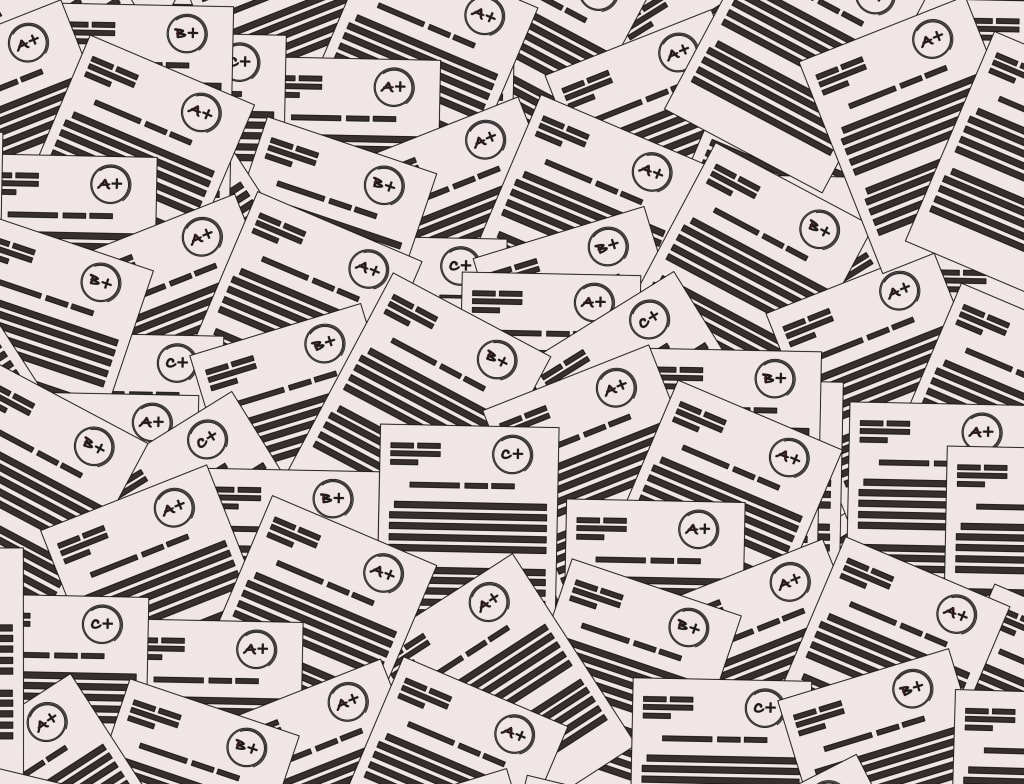What's an 'A' Got To Do With It?
In the end, it isn't your grades that should really matter

I think I’ve figured out one reason it’s so hard to get a job straight out of college without years of experience. Most students are too obsessed with grades. So much so that some will do anything to get an A.
There’s a lot of pressure on college students to do it all and get the full college experience with a perfect GPA. But it’s not healthy to have so much on your schedule, and sometimes it’s impossible to get it all done. When some students inevitably fall behind, they have a few options. They can either cram or find a tutor to help them.
I tutored online on Chegg and Wyzant for 2 years. I was a typical broke Millennial trying to supplement my day job’s income. As soon as I started tutoring, I began to get requests from students who didn’t want me to help them learn, but to help them cheat.
Almost half the time I got a request from a student for help it was really a request for me to do the work for them. Some of them didn’t even realize what they were doing was cheating.
While I didn’t aid in any cheating, I completely understand why some tutors will be tempted to do it. The payout can be massive if it’s a desperate student with more disposable income. I had someone offer me $500 per assignment for an intro class. That’s an easy $500 per week, which is a lot of money, especially when you’re really struggling financially.
This experience made me realize that all of these “entry-level” positions that required several years of experience were due to people graduating without the knowledge needed to perform them successfully. It could also be another reason why C students are more successful after graduating. Most of the C students actually earned their grades and therefore retained more knowledge from their studies.
The worst part is the students who can thrive in college and get good grades are now scrutinized. They are compared with the ones who cheated to “stay competitive.”
The value of an ‘A’ has diminished.
This is something that many employers seemed to have figured out. Employers like Google have been giving people with promise a chance for years, with or without a degree. Google is now trying to take training people interested in entering the tech field into their own hands by launching certification courses. With cheating as pervasive as it is, I think it will be interesting to see how Google handles cheaters.
Will Google create an algorithm to watch their student’s search history more closely for indications of cheating or will the caliber of people entering this program have more integrity than the typical student?
The Motivation behind and The Ethics of Cheating
There are many social and academic reasons for why people cheat in school. Some are trying to have high GPAs to get or keep scholarships and grants so they can afford to go to college. Others are just trying to graduate and get a job afterward. There’s also pressure from parents to do well, but cheating can have lasting effects on how we behave in the future.
A study conducted by San Fransisco State University found that students who are cheating tolerant will be more likely to accept unethical behavior in the workplace. We are inadvertently teaching people that what matters are results by any means necessary. If the ends justify the means, then being unethical is seen as “just bending the rules a little” to get things done.
Because of the long-term effects of cheating, it’s important to understand as many reasons for cheating as possible.
Carnegie Mellon University’s Eberly Center provides the following 10 other reasons why some students may cheat:
“Students might not understand or may have different models of what is considered appropriate help or collaboration or what comprises plagiarism.”
“Students might blame their cheating behavior on unfair tests and/or professors.”
“Some students might feel an obligation to help certain other students succeed on exams — for example, a fraternity brother, sorority sister, team- or club-mate, or a more senior student in some cultures.”
“Some students might cheat because they have poor study skills that prevent them from keeping up with the material.”
“Students are more likely to cheat or plagiarize if the assessment is very high-stakes or if they have low expectations of success due to perceived lack of ability or test anxiety.”
“Students might be in competition with other students for their grades.”
“Students might perceive a lack of consequences for cheating and plagiarizing.”
“Students might perceive the possibility to cheat without getting caught.”
“Many students are highly motivated by grades and might not see a relationship between learning and grades.”
“Students are more likely to cheat when they feel anonymous in class.”
Carnegie Mellon University’s Eberly Center provides educators with strategies to combat each of their suggested cheating motives above.
However, some argue for cheating, like in this article from Wired. A few of the arguments in it were that since schools use grades to “motivate or punish” students and grades have an impact on their future, but they don’t necessarily represent what you’ve learned in the class, you might as well cheat. It also stated that you have to be clever to cheat successfully so some people may feel a sense of accomplishment from it. It's a challenge to beat the system and cheat successfully, which may seem like a fun puzzle to some.
According to that article, the way school is set up now, “knowledge is a disposable commodity.” Which I can only imagine is increasing as the pervasiveness of technology continues to grow.
While I understand and appreciate the points the Wired article made, I feel that there has to be a way that is better for both students and educators.
What Can Be Done?
I think it’s obvious that schools, especially at the high school and college levels, need an educational overhaul. With about 95% of students admitting to cheating on a test or plagiarizing on an assignment, it’s time to try to find ways to fix the education system instead of looking for ways to prevent academic dishonesty. A few ways that I think can really help are:
1. Teach students study skills
One of the reasons students have a hard time with school is because they don’t know the best study techniques for them. This makes the time they take to study seem like a waste because they feel as though they are not remembering enough of the material for the effort they are putting into studying.
2. Teach time management skills to students
Make sure students understand when they are overwhelmed they should say no to some extracurricular responsibilities. Having too much to do can keep students from studying and make them feel as though they have no choice but to cheat just to keep up with all that needs to be done.
3. Ensure that students know that learning takes time
I think that impatience, perfectionism, and competitiveness can be very detrimental to learning. Many students experience at least one, if not a combination of these traits. It’s okay to not understand something at first. No one is born a master in any subject area.
4. Encourage interdisciplinary thinking
Make sure students are connecting previously learned lessons to new lessons and to other subjects. The more you use knowledge the longer you remember it. Creativity and interdisciplinary thinking are staples for future problem solving and discovery.
5. Test students for learning disabilities
I believe that students should be tested for learning disabilities sometime in their K-12 education. Even mild learning disabilities can be a detrimental hindrance to learning. I personally found out that I had learning disabilities half-way through college. When I got the accommodations I needed, my grades improved dramatically.
6. Create a new method to evaluate conceptual understanding
I don’t have a solution for this at the moment. But I think it’s obvious that the letter grade system is just not working. There needs to be a way to evaluate learning and understanding that is as objective as what letter grades seem to be.
Is Cheating Worth it?
The act of cheating is a little odd to me. Some people are cheating to get great grades so that they can have a great job and make their families proud. But those jobs are not hiring them unless they are well connected or have some work experience to back their education up. And even if those jobs did hire them, they probably wouldn’t perform well at the job since they cheated.
However, the students with less than stellar grades that I know personally still had a great start to their careers since they had a lot of relevant work experience upon graduating. Nothing, and I mean nothing, will overshadow experience. That’s because nothing will prove that you can do a job better than actually doing it.
The funny thing is I only got good enough in these subjects to tutor others because I struggled through them on my own and eventually mastered the subjects. My college grades, especially in the first 3 years, weren’t the best. But I found that in the end grades didn’t stop me from landing my first internship-turned-job after college.
I was hired over other candidates for a Library of Congress internship because I had a lot of unique work experiences during undergrad along with my education.
While grades are important, you shouldn’t stress yourself out about having perfect grades. Just focus on learning the concepts to the best of your abilities and get as much relevant work or internship experience as you can before graduating. While great grades can increase your chances of landing a job after college, it alone cannot guarantee success in your career. At the end of the day who you know and what you can do/have done will help to counterbalance any bad grades that may be on your transcript.
About the Creator
Aria Dailee
Research geographer whose mind is full of too many thoughts to keep to herself. Website: https://mymorningmusings.com Elsewhere: https://linktr.ee/ariadailee
Enjoyed the story? Support the Creator.
Subscribe for free to receive all their stories in your feed. You could also pledge your support or give them a one-off tip, letting them know you appreciate their work.






Comments
There are no comments for this story
Be the first to respond and start the conversation.